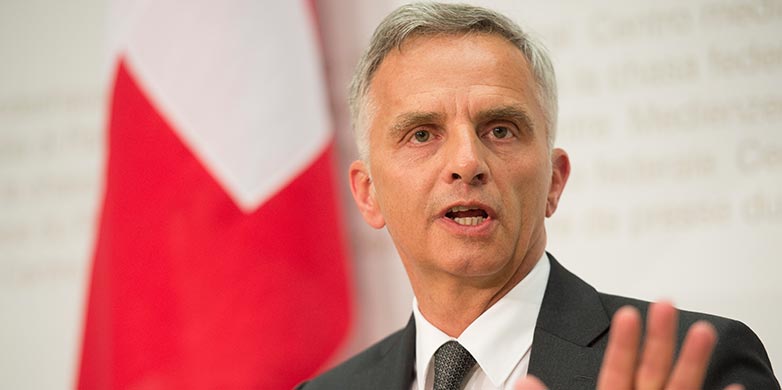One stage completed – further obstacles ahead
After Switzerland's exclusion from the EU education and research programmes, negotiations could now start to move forward again. The aim is to come up with interim solutions for Erasmus+ and Horizon 2020. But foreign minister Didier Burkhalter remains cautious.
«The door was closed in recent months. Now it's been reopened again a little». This is how Didier Burkhalter, President of the Federal Council and foreign minister, described the unblocking of the negotiations with the European Union (EU). Crucial for this relaxation was the EU's acceptance of the Swiss proposal to apply the free movement of persons de facto to the new member state of Croatia, but without signing a corresponding treaty.
The Federal Council confirmed the implementation of this practice on Wednesday in a external page declaration. This means that the negotiations on Switzerland's association in the European education and research programmes (Erasmus+ and Horizon 2020 respectively) could now also start to move forward again. They were suspended following the Swiss electorate's approval of the «Initiative against Mass Immigration» on 9 February 2014.
Heading towards an interim solution
Didier Burkhalter emphasised at a external page press conference in Bern on Wednesday, however, that this relaxation is only an initial stage on the route towards an interim solution. For a full association, the implementation of the national initiative and its effects on the free movement of persons will need to be regulated first. Now the diplomats in Bern and Brussels have the opportunity to actively discuss interim solutions for cooperating in the areas of education and research.
According to Burkhalter, Switzerland wants to start talks immediately and achieve access to Horizon 2020 as early as this year, if possible. However, it is clear for the foreign minister that "even the best possible solution won't be as good as what we had until 2013". Burkhalter also cannot rule out that Swiss universities and research institutions will have to accept fewer leading roles.
Transition measures in place
«The EU programmes are extremely important for ETH», says Roland Siegwart, ETH Vice President Research and Corporate Relations. «They enable us to compete with the best at an international level and implement outstanding research projects in strong partnerships». Researchers at ETH Zurich have been particularly successful in getting grants from the European Research Council (ERC) that support outstanding scientists. «Since 2007 they have received some 200 million francs for projects in fundamental research», explains Siegwart.
In recent weeks, various measures have therefore been adopted to cushion the effects of the exclusion. For researchers at Swiss universities who currently cannot apply for grants from the ERC, the Swiss National Science Foundation (SNSF) has rolled out time-limited transition measures. Following a call for external page SNSF Starting Grants that expired at the end of March, the researchers of ETH Zurich and other Swiss universities can still apply for external page Consolidator Grants of the SNSF until 20 May.
Things have also moved forwards in the area of education. In mid-April, the Federal Council announced that it aims to co-finance external page Erasmus+ mobility projects with the Swiss programme contributions for 2014. An interim solution with the EU will only be possible again in 2015.
Eichler: «EU programmes must be treated as a priority»
Whether or not Swiss students and researchers will again have the opportunity to be fully involved in EU programmes – and if so, from when – is currently not known. For ETH President Ralph Eichler, however, the following is clear: «Much is at stake for Switzerland as a knowledge hub and for ETH Zurich in particular. That's why it's important that the Federal Council keeps its eye on the ball and treats Horizon 2020 and Erasmus+ as a priority».

Comments
No comments yet